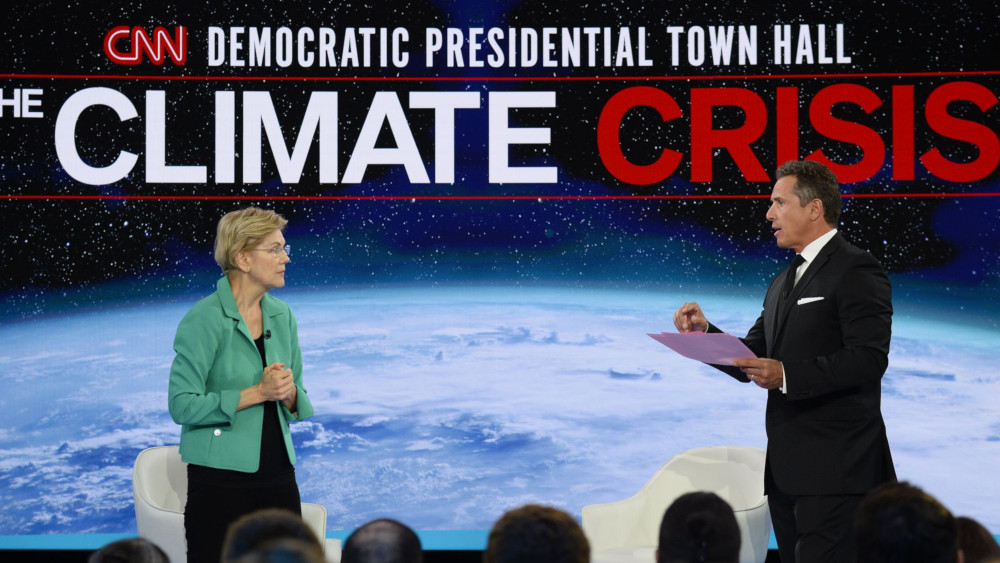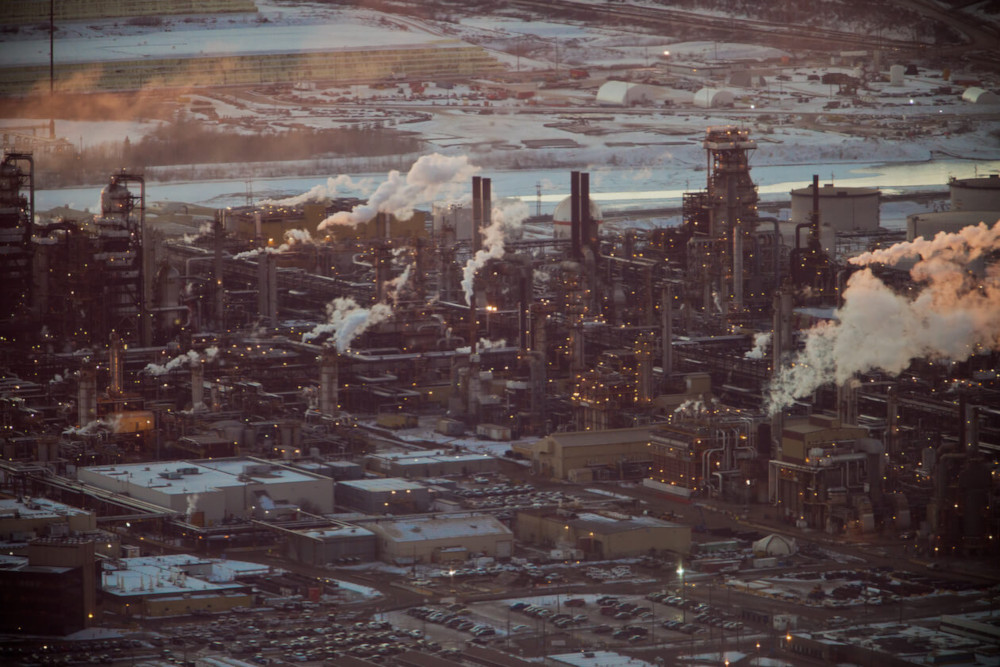What would a climate platform that actually rises to the emergency declared earlier this year by Canada look like? Perhaps something like the plans being put forward by Bernie Sanders, Elizabeth Warren, Kamala Harris and other frontrunners for the U.S. Democratic Party nomination.
It’s not just massive spending commitments that potentially qualifies these plans as emergency-worthy — although the numbers are formidable. Sanders for example promises $16.3 trillion to help shift the U.S. economy away from fossil fuels and create 20 million jobs in the low-carbon economy that comes next.
Nor is it the mind-warping scale and ambition. Warren intends to eliminate carbon emissions from all new buildings by 2028, do the same for new vehicles by 2030 and completely shift America’s power grid to zero-emissions energy by 2035.
The thing that truly sets these plans apart from anything proposed before by a serious contender for U.S. president is their willingness to take on the entrenched political power of the fossil fuel industry. During CNN’s recent town hall on climate change, Harris, a former prosecutor, vowed to take legal action against oil and gas companies for their role in sowing doubt and uncertainty about climate science.
“This is what we did to the tobacco companies. We sued them, we took them to court,” she said. Harris dedicates an entire pillar of her five-pillar climate plan to “hold accountable those responsible for environmental degradation, the misinformation campaign against climate science, and creating harm to the health and wellbeing of current and future generations.”
Sanders similarly promises to go after “fossil fuel billionaires whose greed lies at the very heart of the climate crisis” while raising $3 trillion in funding for his plan by making companies “pay for their pollution, through litigation, fees, and taxes, and eliminating federal fossil fuel subsidies.”
Warren would ban leases for fossil fuel extraction on public lands. At the CNN town hall she accused fossil fuel companies and other industrial giants of “making the big bucks off polluting our Earth.”

Even former vice-president Joe Biden, not exactly the image of an anti-corporate radical, vows to “take action against fossil fuel companies.”
Canada is not even close to having that conversation politically. It may be edging there. On Saturday, the NDP’s Jagmeet Singh pledged to end fossil fuel subsidies.
And last month the Greens’ May, noting full-page ads in newspapers urging citizens vote in support of the oil sands, tweeted, “This is what we’re up against,” declaring, “If humanity doesn’t transition off fossil fuels” by the 2023 election, “the earth will heat to unsafe levels and there will be climate catastrophe.”
Still, although the Liberals, NDP and Greens have all put forward serious climate plans, none of them explicitly name the oil and gas industry as the main barrier to avoiding warming having double the effect on Canada compared to the rest of the world.
“That needs to be part of a climate plan, and it isn’t in anybody’s plan right now, and even saying that in Canada is impolite,” said Keith Stewart, a senior energy strategist with Greenpeace Canada.
“Our problem is upstream oil and gas is the single largest source of greenhouse gas emissions in the country and the fastest rising source, so until we’re willing to tackle the oil industry, then we are not acting like this is an emergency or even a serious problem,” he said.
Emergency measures? Climate platforms compared
Each federal leader is proposing things that put us on the path to solving the climate crisis. Except, that is, for the Conservatives’ Andrew Scheer, whose plan includes no commitments or targets to reduce emissions.
THE LIBERALS
Justin Trudeau is an active booster of oil sands expansion and pipelines, but he’s also brought in a carbon pricing framework that, while inadequate on its own, is still a major piece of climate legislation for a developed country to implement.
“That’s a huge deal. Canada has trade partners, most notably the United States and many others, that do not have carbon prices in place, and yet the Trudeau government has said, ‘we’re going to step up and send a signal throughout the economy to try to get people to change their behaviour,’” said Leah Stokes, a political scientist at the University of California, Santa Barbara, who is originally from Canada.
Meanwhile the NDP and Greens are proposing what are in effect miniature versions of the Green New Deal backed by U.S. progressive superstars like Alexandria Ocasio-Cortez.
THE NEW DEMOCRATS
Jagmeet Singh’s version earmarks $15 billion to create 300,000 low-carbon jobs — a far cry from Sanders’ $16.3 trillion even when you account for the size difference between Canada and the U.S.
“They were trying to appear I think not overly ambitious,” Stewart said of the NDP plan. “What they’ve got is a framework. They’ve sort of built the foundation that could be that [emergency] response, but it isn’t there yet. It’s a case of they’ve got to scale that up rather than start from scratch.”
THE GREENS
Elizabeth May promises that the Greens’ plan will stabilize Canada’s emissions at the level that the IPCC says is required to keep global temperature rise at 1.5 C — which is roughly double the Liberal goal. She’s backed that up with a commitment to create millions of new jobs in energy retrofits, along with a ban on fracking for natural gas.
It’s a far-reaching plan, but arguably lacking in specifics. “They don’t have a clear mapped-out policy package that’s going to get them there, because that kind of change that fast is hard,” Stewart said. “And there’s a part of it where we don’t necessarily know all the details, because a lot of it’s going to be made up as we go.”
‘It’s going to be a hard political fight’
Later in the election The Tyee will publish a more in-depth breakdown on the party’s climate change related platforms and stated positions.
So far, none of the Canadian plans, not even the Greens’, addresses head-on the vast political weight and influence of the fossil fuel industry. Yet, without a rapid phase-out of oil, gas and coal in Canada, the country is virtually guaranteed to miss the 2030 climate targets it agreed to in Paris.
So why aren’t Canada’s federal leaders following the example of their Democratic counterparts in the U.S. by calling out big carbon-based polluters?
“Look, Canada is in a tough spot, we have been a petro-state for the past 15 years and the [Stephen] Harper administration did nothing to try to change that,” Stokes said. “In fairness to Justin Trudeau, he inherited a difficult situation.”
Canada’s political and media establishment has been slow to acknowledge the reality that without rapid and transformative action on climate change, the city of Richmond could be underwater, we may experience wildfires so large they make today’s record blazes seem tame, virtually all of our freshwater glaciers will disappear and Halifax could be battered by 50-year floods every two years.
That cautiousness in our climate debate is perhaps why Singh is described as a “radical” for stating that “the future of our country cannot involve fracking... It cannot involve the burning of any fossil fuel,” whereas Sanders gets mainstream media coverage referring to the fossil fuel business model as a “criminal activity that cannot be allowed to continue.”
No matter how you feel about the confrontational rhetoric, however, it’s long overdue for Canadian politicians to reduce the carbon — and political — footprint of oil and gas companies, Stewart says.
He throws out a few suggestions: no federal permits or funding for infrastructure projects that delay our progress to a 1.5 degrees world, a ban on fossil fuel advertising or sponsorship of public events, a guaranteed high-paying green job for anyone displaced by Canada’s transition to a zero-carbon economy.
“That’s a hard change, I acknowledge that. It’s going to be a hard political fight,” he said.
Yet for context consider the following: the Canadian Association of Petroleum Producers regularly justifies expanding the oil sands by referring to an International Energy Agency scenario that posits no new climate policies could result in the world heating up by 3.5 degrees.
“That’s 7 degrees in Canada,” Stewart said, referring to the fact we’re warming at two times the rate of the rest of the world. “That’s catastrophic levels of change in a short period of time.”
The Tyee’s federal election coverage is made possible by readers who pitched in to our election reporting fund. Read more about how The Tyee developed our reader-powered election reporting plan and see all of our stories here. ![]()
Read more: Election 2019, Politics, Environment

















Tyee Commenting Guidelines
Comments that violate guidelines risk being deleted, and violations may result in a temporary or permanent user ban. Maintain the spirit of good conversation to stay in the discussion.
*Please note The Tyee is not a forum for spreading misinformation about COVID-19, denying its existence or minimizing its risk to public health.
Do:
Do not: